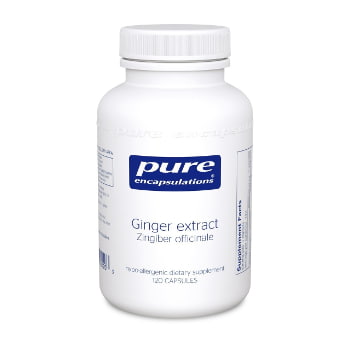Nausea is a sensation we’ve all experienced. Whether it’s from a seemingly roller-coaster ride in the car, the food we eat, pregnancy, or anything in between, it’s a feeling you would do almost anything to get rid of once you have it. They often say people who are feeling woozy look “green” in the face and, as Kermit the Frog likes to say, “It’s not easy being green.”
You may have heard of drinking ginger ale when you feel sick to your stomach. But is there any scientific evidence that ginger works, or is it just a myth? The latest research indicates that there are benefits to treating your stomach “gingerly” and having a ginger supplement around for the next time you encounter nausea or before you anticipate the onset of nausea.
What is Nausea?
Nausea is often described as a queasy feeling or very uncomfortable sense of uneasiness deep within the stomach. In other words, it is often that feeling you have right before you need to vomit. Nausea is a common symptom that can occur with a variety of everyday conditions such as motion sickness, pregnancy, drug side effects, and migraines.
Why do we get nausea?
Nausea is a common, but poorly understood, sensation. Many believe that nausea is a natural “defensive mechanism.” Bacteria, viruses, spoiled food, or harmful chemicals can irritate the stomach lining which can trigger nausea and vomiting. This kind of nausea is necessary and an example of the body simply protecting itself.
However, there are other events that trigger nausea where it is not necessary or wanted. For example, seasickness or nausea from traveling by plane or car is more related to the central portion of the brain and its perceived interpretation of our activities. Often the brain will experience mixed or conflicting signals in the inner ear, eyes, or sensory receptors. When it can’t see or feel the motion your body is experiencing, it can trigger a complex neurological interaction between the central nervous system and the digestive system. This causes the release of chemicals within the bloodstream (vasopressin and epinephrine) which are thought to trigger nausea symptoms.
Ultimately, much of nausea is how your brain chooses to respond to what you’ve eaten and your surroundings. But recent research has demonstrated that ginger may be able to help with many common sources of nausea.
How does ginger help?
Ginger, a flavorful root that is widely used in cooking, has been a go-to natural solution for nausea for a long time – particularly in Asian and Arabic medicines. It can be found in grocery stores, but many people don’t love its strong flavor enough to eat large, therapeutic doses of it when nauseous. For this reason, ginger supplements are very popular.
What does the science say?
Research has not determined exactly how ginger helps. There are numerous active ingredients present in ginger, but its therapeutic effectiveness may be a result of the oil from the ginger root being able to stimulate digestive enzymes. This action seems to reduce serotonin levels in the digestive process, thereby reducing nausea. Researchers conducting a scientific review, published in International Journal of Preventive Medicine, concluded that ginger also works through its anti-inflammatory properties and functional ingredients like gingerols, shogaol, and paradols.
Motion sickness
A study published in the American Journal of Physiology examined ginger’s effect on people with a history of nausea from motion sickness. Subjects were placed into a rotating drum and asked to report and describe their feelings of nausea. The ones given ginger supplements reported experiencing less nausea during the testing, and having a shorter recovery period from the nausea after the test, compared to those who received a placebo instead. The researchers didn’t fully understand why ginger seems to work, but noted that ginger reduced the rate of contractions of the stomach and decreased the release of a hormone commonly increased by motion sickness.
Migraines
If your nausea tends to come from migraines and cluster headaches, ginger also appears to help. Phytotherapy Research published a study comparing the common migraine medication sumatriptan to ginger powder for migraine relief. One hundred patients who had acute migraines were randomly allocated to receive either ginger powder or sumatriptan. The researchers state that the efficacy of the ginger and sumatriptan were about the same – but the ginger came with less side effects. Some believe ginger helps with migraines due to its anti-nausea and anti-inflammatory actions. For more information about addressing migraines, read my previous article, “Can Nature Make Migraines Less of a Headache?”
Pregnancy/morning sickness
Researchers looked into ginger’s effect on pregnant women with nausea in a study from Midwifery. They compared the effectiveness of ginger and vitamin B6 and found that ginger was the better option. Over a 3-month period, the pregnant women were randomized to be given either ginger or vitamin B6 for four days to see if the treatments improved nausea symptoms compared with baseline. Both supplements appeared to decrease total vomiting episodes, but the women who took ginger reported a larger improvement in overall nausea symptoms in early pregnancy. There is no specific explanation as to how ginger works with morning sickness, and the American College of Obstetricians and Gynecologists recommends that women try both vitamin B6 and ginger to help ease the nausea associated with common morning sickness.
Prescription drugs
There are studies that show potential for ginger to help with nausea from certain prescription drugs — a primary cause of nausea for many. Research published in American Journal of Obstetrics and Gynecology details how ginger is more effective than placebo for the prevention of postoperative nausea and vomiting – which is often caused by an adverse reaction to anesthesia. The authors of a scientific review from Dialogues in Clinical Neuroscience note that some patients who suffer from nausea related to antidepressants benefit from ginger-containing food and beverages.
Any other effective solutions?
Many people turn to anti-nausea pharmaceuticals, like Zofran® and Compazine®, for relief or over the counter drugs like Dramamine® . They seem to work by blocking the effects of serotonin, which stimulates nausea. While these can be effective for some people, they come with the potential for deeply unpleasant side effects such as dizziness, headache, constipation, anxiety, and mood changes. Ginger is also ideal because it doesn’t have the drowsiness side effect of Dramamine®. Because of this, consider trying natural solutions (such as ginger supplementation) before resorting to these drugs.
Acupuncture and acupressure are also popular treatments for nausea, but is unclear how effective they are. Some studies show potential, whereas others show limited to no benefit. Peppermint or lemon aromatherapy, deep, slow, controlled breathing, and vitamin B6 supplementation are all reported to be effective by some people, but the scientific evidence for these approaches is lacking. Other popular natural tips for avoiding nausea include abstaining from spicy foods, large meals, strong smells, and avoiding drinking liquids with meals.
Which ginger supplements should I start with?
Most of the studies demonstrating ginger’s effectiveness used daily doses between 1,000 and 2,000 milligrams. I suggest Ginger Extract by Pure Encapsulations or Ginger Root Max-V by Douglas Laboratories. Both Pure Encapsulations and Douglas labs have assayed their products, contain the ingredients in the amounts that they claim, have unwavering manufacturing standards and have no artificial fillers — only natural product ingredients. Note that ginger may interfere with blood-thinning medications, such as Aspirin® or Coumadin®, so it’s always good to speak with your doctor before starting any new regimen.
There are many ways to address feelings of nausea, but few combine effectiveness with safety like ginger does. So the next time you are feeling a bit green, or you anticipate an event that will bring on that woozy feeling such as flying or traveling by boat, consider taking ginger before. If you have any questions regarding the concepts discussed here or anything else, you can reach our customer service team at customerservice@oakwaynaturals.com or you can call them at 888-460-3091.
Until next time, stay healthy!
Yours in health,
Dr. Gregg Gittins
www.OakwayNaturals.com












Comments are closed.